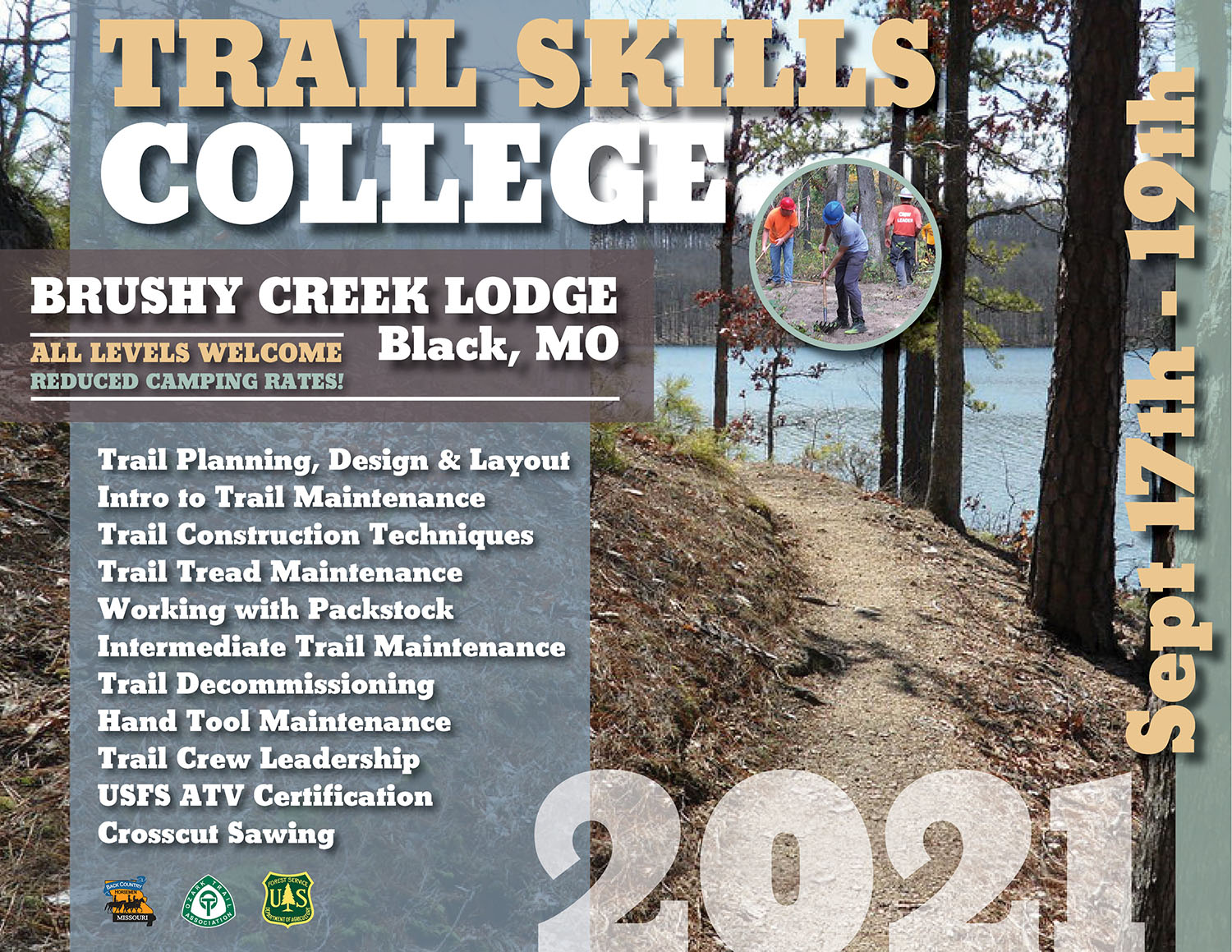
Course Descriptions
September 17-19, 2021
Brushy Creek Lodge
SATURDAY, SEPTEMBER 18TH
8:00AM – 10:00AM
2A/4E: Trail Planning, Design and Layout:
Good trails require thoughtful and intentional design. Jon Breithaupt from the Mark Twain National Forest will share best practices for planning and designing trails and will provide insight into the National Environmental Policy Act (NEPA) and how it applied to approving new trails and certain trail maintenance work.
3A: Trail Tread Maintenance:
There is more to maintaining trail networks than logging out down trees and brushing out trail corridors. JR Rhodes from the Mark Twain National Forest will lead this course on how to maintain trail tread to minimize water damage and maximize long term sustainability.
4A/6A: Trail Crew Leadership:
Ozark Trail Association President Kathie Brennan has been a practitioner in the field of trail crew leadership for many years. Course participants will gain an understanding of the responsibilities and traits necessary to lead a crew in the field successfully.
10:15AM – 12:00PM
2C: Introduction to Trail Maintenance:
Join Ozark Trail Association’s Trail Construction and Maintenance Committee Chair Terry Hawn for the best practices on logging out down trees, brushing back vegetation, installing signs and trail blazes and more. This course is for beginner level trail stewards.
3C/5A: Working with Packstock:
For centuries, horses and mules have been used to accomplish work deep in the backcountry. Backcountry Horsemen of Missouri’s Jonathan Stewart will lead this course on how to work with packstock and work alongside them to get more work done on the ground. This course will be beneficial for all user groups.
4C/2E: Intro to Traditional Skills: Crosscut Saws:
In accordance with the Wilderness Act of 1964, no mechanized or motorized machinery is allowed in federal wilderness areas. To accomplish trail maintenance in areas such as Missouri’s Irish, Bell Mountain and Piney Creek Wildernesses, crosscut saws are used to log out down trees to keep trails passable. Join JR Rhodes from the Mark Twain National Forest to learn how to operate these saws proficiently as a volunteer alongside a qualified crosscut B sawyer.
1:00PM – 3:00PM
2D: Trail Construction:
Learn techniques to construct new trail using hand tools alongside the Mark Twain National Forest’s Jon Breithaupt. Best practices, tools, safety and efficiency strategies will provide even the experienced trail builder with new skills.
3D: Intermediate Trail Maintenance:
Have you been maintaining trails for a while at the entry level and are looking to grow your skillset? Ozark Trail Association’s Trail Construction and Maintenance Committee Chair Terry Hawn will help you take your trail maintenance skillset to the next level in this course.
4D: Hand Tool Maintenance:
Ozark Trail Association’s Mark Goforth will lead this course on how to properly maintain your hand tools for maximum efficiency and effectiveness in the field. Topics include proper storage, sharpening, handle maintenance and more.
3:15PM – 5:00PM
4C/2E: Intro to Traditional Skills: Crosscut Saws:
In accordance with the Wilderness Act of 1964, no mechanized or motorized machinery is allowed in federal wilderness areas. To accomplish trail maintenance in areas such as Missouri’s Irish, Bell Mountain and Piney Creek Wildernesses, crosscut saws are used to log out down trees to keep trails passable. Join JR Rhodes from the Mark Twain National Forest to learn how to operate these saws proficiently as a volunteer alongside a qualified crosscut B sawyer.
3E: Trail Decommissioning:
In the course participants will learn the best practices for restoring old trailways to their natural condition. This is an especially important skillset to have when poor segments of trail are re-routed and the old trail segment must be returned to nature.
2A/4E: Trail Planning, Design and Layout:
Good trails require thoughtful and intentional design. Jon Breithaupt from the Mark Twain National Forest will share best practices for planning and designing trails and will provide insight into the National Environmental Policy Act (NEPA) and how it applied to approving new trails and certain trail maintenance work.
SUNDAY, SEPTEMBER 19TH
8:00AM – 10:00AM
3C/5A: Working with Packstock:
For centuries, horses and mules have been used to accomplish work deep in the backcountry. Backcountry Horsemen of Missouri’s Jonathan Stewart will lead this course on how to work with packstock and work alongside them to get more work done on the ground. This course will be beneficial for all user groups.
4A/6A: Trail Crew Leadership:
Ozark Trail Association President Kathie Brennan has been a practitioner in the field of trail crew leadership for many years. Course participants will gain an understanding of the responsibilities and traits necessary to lead a crew in the field successfully.
8:00AM – 12:00PM
5B/5D: US Forest Service ATV Certification:
In certain areas, operating an All-Terrain Vehicle (ATV) is the most efficient way to get trail work accomplished. The Mark Twain National Forest’s Jeremiah Privett and Ron Moon will host two four-hour courses that will give participants a certification to operate ATVs on non-motorized trails for administrative trail construction and maintenance purposes.
1:00PM – 5:00PM
5B/5D: US Forest Service ATV Certification:
In certain areas, operating an All-Terrain Vehicle (ATV) is the most efficient way to get trail work accomplished. The Mark Twain National Forest’s Jeremiah Privett and Ron Moon will host two four-hour courses that will give participants a certification to operate ATVs on non-motorized trails for administrative trail construction and maintenance purposes.

This educational opportunity is made possible through a generous grant from the L-A-D Foundation in partnership with the US Forest Service, Backcountry Horsemen of Missouri, and the Ozark Trail Association.
